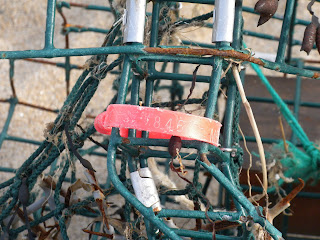8743 A1 0037 ME 07 EEZ Z:G
??13 A1 0645 ME 08 Z:F
0003369 ME 03 NC
???? A1 0189 ME 09 Z:G EEZ
846 ME 00 EEZ
3754 0445 ME 02 EEZ
???? 0344 ME ?? ????
72595 0754 ME 03 EEZ
No, your Web browser isn't freaking out. The codes above come from plastic tags attached to derelict lobster traps, washed up along the shores of Ocean Park.
These hulks litter the beach. As well as hundreds of pounds of rope and shredded bits of metal caging hopelessly tangled amid the carcasses.
So far I've found more than a dozen relatively intact ones, and dozens more scraps and shreds (which admittedly required walking some 7 to 8 blocks instead of 2). The true scale is probably much greater, as the sands are expert at hiding the sharp, rusted, twisted remains.
Each one of these crumpled, crushed, and torn boxes tells a story. As do the codes on the tags. After some digging, I've learned how to decipher them, largely. Let's take a complete one:
8743 A1 0037 ME 07 EEZ Z:G
8743 is the owner's license #.
A1 is the American Lobster Management area for MA/ME.
0037 is (I believe) the trap #.
ME 07 says the tag was registered for the year 2007.
EEZ = "Exclusive Economic Zone" - a zone 12-200 mi. from shore.
Z:G is Maine's zone G -- from NH border to roughly Portland.
What's striking is how many of these traps come from EEZ -- that is, at least 12 miles off the coast. One can imagine the tortured tale. Each of these traps at some point tore free from its buoy, then scraped and rolled along the seabed until eventually washing up on shore -- in at least one case (ME 00) seemingly a decade-long trip! It's sobering to consider how many more are in the deeps, waiting their turn.
What else struck me was -- why are they still here? These rotting, dangerous, disintegrating hulks are still there at the beach, visit after visit. Why doesn't anyone take them away?
It turns out, it's illegal. According to Title 12, Part 9, Subpart 2, Chapter 619, Subchapter 2 of Maine's Statutes, it is an offense to remove a trap from the beach without getting written permission from the Commissioner of Marine Resources first. A law originally meant to keep lobstermen from hassling each others' traps could now result in up to $6000 in fines for removing a dozen derelict and broken traps currently fouling a beautiful beach.
How safe do you feel, knowing that this might be under your daughter's feet?





Hi Harry,
ReplyDeleteWhat a great blog you have here! I work at the Gulf of Maine Lobster Foundation (www.gomlf.org) based in Kennebunk, and have recently conducted some at-sea derelict gear recovery projects with the lobster industry. I wanted to comment on a couple things you mentioned above -
First off, you are right on target regarding why the traps are still on the beach -- technically the only person allowed to handle a lost lobster trap is its owner. This makes cleaning them off the beach a matter of obtaining permits from the State.
EEZ -- yes, that does mean that the trap can be legally fished in federal waters (anything outside of the 3-mile state water line) -- but those same traps are just as likely to be fished inside state waters during the year when the lobsters move inside (i.e. summer), so any derelict trap you find in Ocean Park w/ an EEZ tag may have come from as close as Wood Island or somewhere else in Saco Bay.
ME 00, ME 07, etc -- when you find a derelict trap, you can often tell the minimum age of the trap by the year on the tag. Some traps will have many years' worth of tags, so the newest tag will tell you when the lobsterman last fished that trap before it was lost.
Thank you for keeping such a great blog, and for sharing the process w/ us. I've bookmarked it and will check back often!
Hi Laura! Thank you so much for the comment and all the great info. I'm especially glad to learn about the EEZ -- it was hard to believe that the majority of traps were coming in from the farthest offshore.
ReplyDeleteI've bookmarked your great Web site and will add it to my links list here. It must be a constantly tricky tightrope to walk between lobstermen working extremely hard to earn an honest living amid a tangle of rules & laws, and scientists/beachgoers trying to ensure a clean and safe and sustainable environment. I don't envy anyone that task!
Thanks also for the info on multiple tags. Funny enough, I just found two derelict traps south of Ocean Park with 4-5 tags on them (new post forthcoming). Good to know that finding one tag doesn't always give a guaranteed year of loss. Reminds me again of archaeology. If you find a coin from, say, 1800, it couldn't have been dropped in 1790, but it -could- have been in 1801, or 1850, or 1950, or yesterday.